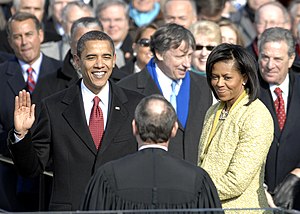Ryan refreshingly combines a command of the substance of public policy with the style needed to communicate free-market solutions in an appealing fashion. Unlike the last Republican vice-presidential nominee, Ryan will have no problem speaking persuasively and specifically about the federal Leviathan’s every activity and expenditure.
Agree or disagree with him, no one can accuse Ryan of lobbing platitudes around Washington. Instead, he has authored the last two budgets adopted by the House of Representatives. Harry Reid and his Democratic majority must justify the fact that the Senate killed both of these budgets, unanimously defeated
President Obama’s last two spending plans, and illegally has
refused to pass any such blueprint of its own since April 29, 2009. Ryan’s
Path to Prosperity would put Washington on a diet — if not the crackers-and-tap-water menu it deserves, at least not Team Obama’s free-of-charge, come-one-come-all, 24-hour gourmet smorgasbord.
Ryan is ideally suited to battle the Left on Medicare, a battle they surely will try to turn into Gettysburg 2012. They will accuse Romney and Ryan of wanting to gut Medicare, unplug sick seniors from their intravenous drips, and force them to dehydrate in the sun-drenched parking lots of eldercare centers across America. In the most vile, despicable, and revolting
political ad since Lyndon Johnson notoriously intimated that Barry Goldwater would kill a flower-picking little girl in a thermonuclear exchange, liberals showed a Ryan-like congressman hurling an old lady from her wheelchair into a ravine, surely to her death.
Democrats likely are crafting commercials that will make the throw-Granny-off-a-cliff spot look like Ryan’s family album.
To that, Ryan will respond: First, no one over age 55 will be affected by any proposed changes to Medicare. Second, just as every member of Congress does now, those under 55 will have the option — if they wish — to purchase health plans that reflect their tastes and preferences, rather than a single plan dictated by our masters in Washington. Third, based on their economic needs, the federal government will provide financial assistance to help them buy such coverage. The rich will get less help; the poor will get more. Fourth, any senior who finds this unattractive is welcome to remain in Medicare as we know it.
Absent such reforms, Ryan will explain, it won’t be Granny going over the cliff. It will be the entire Medicare system — with the rest of the federal budget and much of the American economy tumbling soon thereafter.
Ryan also will be able to expose Obama and the entire Democratic Left for their monumental, breathtaking hypocrisy on Medicare. Any Republican who suggests saving $100,000 in Medicare expenses by replacing Kleenex with generic tissue would be accused of launching a pneumonia pandemic against seniors.
Meanwhile, to finance Obamacare, Democrats swiped $500 billion (with a b) from the Medicare Trust Fund and plopped it into Obamacare’s coffers. Thishalf-trillion-dollar robbery from Medicare occurred with no one on the Left calling 911 to report this crime. Indeed, they cheered it on.
Even more fraudulently, Team Obama simultaneously dedicates these (un)
Affordable Care Act funds to underwrite future Medicare benefits.
Secretary Sebelius admitted: “Both.”
“So,” Shimkus responded, “you’re double-counting.”
Ryan is perfectly prepared to educate Americans on the Democrats’ cynical thievery and, finally, put them on defense on Medicare.
Atop his substance, Ryan also brings style to the ticket. Ryan is Congress’s handsomest member, and his youthful energy and general exuberance are infectious. His smiling optimism will make it very hard for Democrats to portray him as a nasty, cold, heartless Granny killer. While Senator Rob Portman (R., Ohio) looks like someone with an Excel spreadsheet where his heart is, Ryan indubitably has ventricles and an aorta in his chest. Try as they will, Democrats will struggle to twist Ryan into the vicious caricature into which they often transform Republicans.
Ryan also can talk tough without being mean. His
speech this morning in Norfolk, Va., before the
USS Wisconsin deftly offered solid hits on Obama’s record without the snarls that might rattle independents or fragile centrists.
Ryan smoothly refuted Obama’s notorious slap at job creators. As Ryan put it today: “If you have a small business — you did build that.”
He nicely threw Obama’s entire class-warfare theme back into the president’s face. As Ryan said: “We Americans look at one another’s success with pride, not resentment, because we know, as more Americans work hard, take risks, and succeed, more people will prosper, our communities will benefit, and individual lives will be improved and uplifted.”
Ryan concisely critiqued Obama’s entire approach as president and contrasted it with his and Romney’s plans. As Ryan stated: “We won’t duck the tough issues . . . we will lead! We won’t blame others . . . we will take responsibility! We won’t replace our founding principles . . . we will reapply them!”
In naming a running mate with intellect, gravitas, seriousness of purpose, courage, charm, and communications skills, Romney’s recruitment of Ryan recalls another Republican “R” — Reagan.
— New York commentator Deroy Murdock is a Fox News Contributor, a nationally syndicated columnist with the Scripps Howard News Service, and a media fellow with the Hoover Institution on War, Revolution, and Peace at Stanford University.




























